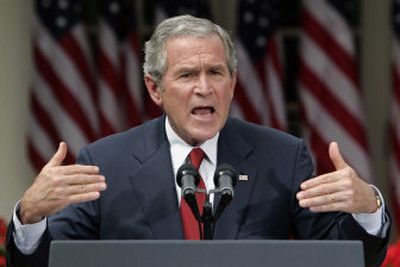Bush blasts GOP senators over rival detainee plan

WASHINGTON – President Bush warned defiant Republican senators Friday that he will close down a CIA interrogation program that he credited with thwarting terrorist attacks if they pass a proposal regulating detention of enemy combatants, escalating a politically charged battle that has exposed divisions within his party.
An irritated Bush, raising his voice and gesturing sharply at a Rose Garden news conference, excoriated legislation passed by a Senate panel Thursday intended to conform U.S. detainee practices to the Geneva Conventions. Bush insisted on legislation more specifically defining what is banned so intelligence officers would not worry about being charged with war crimes.
“The professionals will not step up unless there’s clarity in the law,” Bush said. “So Congress has got a decision to make: Do you want the program to go forward or not? I strongly recommend that this program go forward in order for us to be able to protect America.”
The president’s threat to end the interrogation program seemed to make little impression on the Republican dissidents who have balked at his interpretation of the Geneva Conventions. Sens. John McCain, R-Ariz., and Lindsey Graham, R-S.C., two of four Republicans who voted against Bush’s position on Thursday, again rejected his logic after the news conference, and a fifth Republican senator, Olympia Snowe of Maine, joined the rebellion against the president.
“Weakening the Geneva protections is not only unnecessary but would set an example to other countries, with less respect for basic human rights, that they could issue their own legislative ‘reinterpretations,’ ” McCain said in a written statement. “This puts our military personnel and others directly at risk in this and future wars.”
The dispute over how the United States conducts its ongoing battle with international terrorists dominated a question-and-answer session with the president that touched on a variety of high-profile issues 53 days before the midterm elections.
At a time when Bush hoped to be drawing distinctions with Democrats, though, he spent most of the conference arguing with fellow Republicans.
The most explosive debate centers on how the Geneva Conventions should apply to U.S. intelligence officers, who captured, held and questioned terrorism suspects in secret overseas CIA prisons for years until the last 14 detainees were transferred recently into military custody at Guantanamo Bay, Cuba.
The Supreme Court ruled in June that U.S. detainees fall under the Geneva Conventions, which require that wartime captives be “treated humanely” and ban “outrages upon personal dignity.” Bush wants legislation interpreting the conventions as barring “cruel, inhuman or degrading” treatment. The broader “personal dignity” phrases, he argues, are so vague that they leave interrogators open to prosecution for a wide variety of techniques.
McCain, Graham and Senate Armed Services Committee Chairman John W. Warner, R-Va., have rejected the Bush approach as too narrow and as an invitation to other countries, including Iran, Syria and North Korea, to reinterpret the Geneva rules as they see fit if they ever hold U.S. soldiers.
Another dispute centers on trials for terrorism suspects, who in the Bush proposal could under some circumstances be barred from the proceedings and not allowed to view classified evidence against them. The Republican legislation, passed by Warner’s committee 15-9 on Thursday, would make it more difficult to introduce secret evidence.